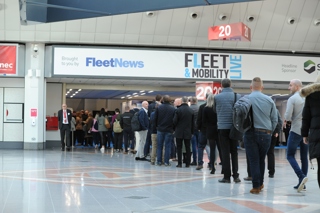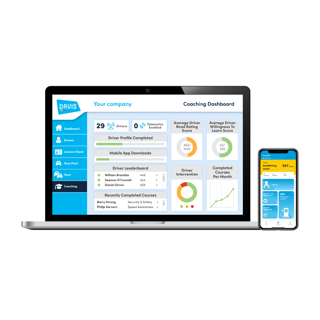Does anyone know what a tonne of CO2 looks like?
Perhaps not, but the average company car travelling 20,000 miles a year will emit approximately five tonnes of the odourless, colourless gas which is enough to fill an Olympic size swimming pool.
Carbon footprint reduction is a key corporate social responsibility issue for many organisations and for others it should be rapidly flying up the agenda on the back of forthcoming regulations.
And with vehicle emissions a major component of many organisations’ carbon footprints, fleet operators have a critical role to play in helping companies reduce it.
Gary Davis, joint founder and operations director of Edinburgh-based Ecometrica, a specialist provider of carbon emission accounting solutions, says: “One of the biggest opportunities that exists for fleet managers to save money is by reducing their carbon footprint.
“Once they know their carbon footprint they can introduce efficiency measures and communicate the savings to staff, customers and other stakeholders.
"Reputation management is hugely important and one of the best ways of showing that is via carbon reduction.”
Indeed, Davis says that fleet managers can become the new carbon reduction superheroes by playing a role in reducing the greenhouse gas (GHG) footprint of their organisations.
“Fleet managers have the ability to reduce GHG emissions considerably, compared to anyone in an average corporate role,” he says.
For example, Ecometrica highlights a fleet of 100 cars that averages 180g/km.
If a fleet manager reduces that to an average of 140g/km, that will reduce CO2 emissions by 80 tonnes per year assuming that the average car travels 20,000km (12,427 miles), which is the equivalent of taking 16 cars off the road.
There is very strong scientific evidence that people are changing the world’s climate with actions that create emissions of greenhouse gases like CO2 and one of the major contributors is vehicles.
That is why the Government has a multi-faced strategy to cut emissions by at least 80% by 2050 and, as part of its plan, is introducing mandatory GHG emission reporting for publicly quoted companies from April 2013 – local authorities have been reporting their GHG emissions, including transport emissions, since 2008/9.
About 1,800 businesses listed on the London Stock Exchange will be subject to the new regulation, which could be extended from April 2016 to all large companies – a potential 31,000 businesses defined by the Department for Business Enterprise and Regulatory Reform as employing more than 250 people, with turnover of more than £22.8 million and gross assets above £11.4m.
Under the Companies Act 2006, to be classified as ‘large’ the company must meet the threshold for size on at least two of these three measures.
GHG reporting includes emissions from vehicles ‘owned or controlled’ by companies, including cars, vans and HGVs.
But, the regulations – consultation on the draft rules ends on October 17 – excludes the mandatory reporting of business travel by means ‘not owned or controlled by the organisation’, which includes employees driving their own vehicles on business trips, the so-called ‘grey fleet’.
The Government has said it has excluded such journeys due to logistical difficulties and the administration burden.
Nevertheless, it is asking companies to voluntarily report emission levels linked to such vehicle use.
Paul Jackson, managing director of TMC (The Miles Consultancy), says that while the final details remained unclear: “Since business mileage is a primary driver of GHGs, large businesses should be looking at mechanisms for recording and analysing it in order to comply with the regulations.”
John Webb, principal consultant at Lex Autolease, Britain’s largest vehicle leasing company, says it is important that fleets measure their emissions in terms of Government strategy, their own sustainability, the environment and, critically, because reducing emissions delivers tax and fuel bill savings.
However, he is critical of the proposals for mandatory carbon reporting, saying: “Reporting emissions is a good thing to do and we give our customers the tools to calculate their emissions.
"But the scope of reporting business travel must be consistent.”
Consistency needed
With ‘grey fleet’ mileage currently excluded from the regulations, Webb says: “Businesses that have been diligent in introducing low emission vehicles to their fleets could be penalised while organisations that run a large ‘grey fleet’ composed of older, higher emission vehicles do not have to report.
"That seems wrong.
"There needs to be consistency. The method of procurement/operation should not dictate the reporting of CO2 emissions.”
A recent Lex survey of almost 500 financial directors revealed that 63% were not aware of the Climate Change Act 2008, which obliges the Government to introduce mandatory carbon reporting for all UK businesses.
The same proportion of financial stakeholders (63%) also believe that mandatory carbon reporting would ‘make no difference’ to their organisation while a quarter (25%) think it will ‘inhibit business growth’.
Mark Chessman, commercial director with responsibility for sustainability at Lex Autolease, says: “This is a pessimistic view and one that isn’t shared by many other stakeholders who advocate carbon reporting on the basis that it would bring numerous business benefits, such as increased productivity, cost reduction and enhanced CSR over the longer term.
“But it can only be truly effective if those responsible for signing-off reports – financial directors – are aware of and fully convinced of the benefits it can create for their organisations.”
Companies fined
Businesses that have yet to start calculating their carbon footprint should take heed from the experience of companies that are having to report electricity usage under the CRC Energy Efficiency Scheme, which was previously known as the Carbon Reduction Commitment.
Four companies have recently been fined a total of £99,000 – the largest single fine was £41,000 – by the Environment Agency for failing to comply with the carbon reporting legislation.
Tom Kelly, energy services manager at Inteb, a sustainability and low energy solutions specialist that compiles energy efficiency audits and provides advice to reduce emissions, says the mandatory reporting of emissions would be a shock for many and knowing where to turn for help was crucial.
Penalties under the forthcoming regulations have yet to be announced but, under CRC, reports not submitted within 40 working days of the due date are subject to a £5,000 penalty and an escalating fine of £500 for each working day past the deadline.
If the annual report is inaccurate, the business will be liable for £40 per tonne of CO2 incorrectly reported.
Falsified reports can result in criminal liability, an unlimited fine, imprisonment of up to two years, or both.
Fleet software specialist Jaama says that with the UK becoming the first country to make it compulsory for companies to include emissions data for their entire organisation in their annual reports, it is critical that they have technology in place for a fleet emissions audit trail.
Meanwhile, some businesses have turned to carbon offsetting because, according to ClimateCare, taking responsibility for environmental and social impact is becoming a hygiene factor for businesses, rather than a ‘nice to have’, because consumers, investors and stakeholders expect it.
Edward Hanrahan, director of ClimateCare, says: “Fleet managers are responsible for a large amount of travel and, consequently, even with the most determined efforts to cut emissions through efficiencies, they are responsible for a large carbon footprint.
“Once an organisation has plucked the ‘low hanging fruit’ in terms of emissions reductions, it can become increasingly costly and difficult to reduce them further. Spending the same money could achieve much greater CO2 reductions elsewhere in the world and contribute to sustainable development.
“Carbon offsetting is a way for companies to take responsibility for their impact and make a positive difference by committing to fund a reduction in carbon emissions equal to the emissions generated through their own activities.”
A number of leasing companies offer carbon offsetting but to-date take-up has been virtually non-existent.
Derek Thornton, head of account development at Hitachi Capital Vehicle Solutions, says the company associated itself with a carbon offset specialist six years ago and some customers were interested.
However, he says: “When the recession struck carbon offsetting fell off the fleet radar. Carbon offsetting is a great idea, but there is a financial cost attached to it.
"The recession further turned the focus on CO2 vehicle emissions and driving those down while improving fuel economy and thereby reducing costs. The concept of going that extra mile and carbon offsetting has not been talked about for a few years.”
For the majority of fleets without green plans – 55% according to a study by Alphabet – a strategy of letting the tax system and car manufacturers do all the running around on lowering their CO2 emissions has largely paid off… so far, although many have introduced a company car policy emissions cap.
But, the study says: “Vehicle CO2 is only one element in green fleet management.
"It is the businesses that have accepted the challenges of also changing drivers’ mindsets and the fundamental basis of vehicle allocation and use that are more likely to thrive in the future as proactive participants in accelerating changes.”
However, April 2013’s tightening of the corporation tax lease rental disallowance from 160g/km to 130g/km could prove to be a new spur to further cut emissions allied to the simultaneous introduction of carbon reporting for publicly quoted companies, says Thornton.
Ogilvie Fleet is considering offering customers a carbon offset option and already highlights a model’s
predicted carbon footprint over the contracted period on all quotes.
The leasing and fleet management company’s sales and marketing director Nick Hardy says: “Environmental awareness and responsibility is growing. We think there will be a rising demand for fleet carbon offsetting because, even though there is a cost attached, the PR and marketing opportunities that can result alongside new business opportunities mean overall there is likely to be a net financial benefit to organisations.
“Carbon offsetting will be influenced by the demands on business to report their carbon footprint. Currently businesses are all for choosing low emission vehicles, and offsetting emissions to zero is not something that has entered the consciousness of many organisations.
But for two years Ogilvie Fleet has been quoting each model’s carbon footprint over the contract period, which we believe is unique and, once again, puts the company ahead of the industry.”
Meanwhile, Carbon Neutral Investments (CNI) has signed a deal to become the approved supplier of carbon credits for the National Courier Association (NCA) – an organisation that represents a fleet numbering more than 2,500 vehicles across the UK and Eire.
Kevin Grey, NCA president, says: “Logistics and courier services are often perceived as a polluting industry given the number and size of vehicles used.
“However, we take our commitment to the environment very seriously and this partnership with CNI is the latest step in our carbon policy.”
Ed Carlton, head of UK operations at CNI, says: “Fleets can drive their carbon footprint down by selecting low emission vehicles, encouraging employees to adopt a smooth driving style, utilising improved journey planning and remapping engines.
"But fleets will always have a carbon footprint, so carbon offsetting comes in from a corporate social responsibility (CSR) point of view.
“Being carbon neutral can be a major marketplace differentiator for business.
"CSR is a key issue for businesses and stakeholders with pressure also coming from clients who want to know their suppliers’ green credentials.”
Supporters of carbon offsetting point to major PR and marketing opportunities as well as the ability to secure additional business for organisations who choose to become carbon neutral by buying credits per one tonne of carbon dioxide equivalent (CO2e) to fund certified carbon reduction schemes worldwide.
The cost of credits varies from project to project but typically equates to £2-£10 per tonne. There are hundreds of validated schemes around the world that fleets can use carbon credits to fund.
They include, for example, wind power generation schemes in India, a hydro power scheme in Indonesia, an agriculture and forestry scheme in Peru, waste handling and disposal projects in Malaysia and a livestock and manure management scheme in Brazil.
In working with the NCA, Carbon Neutral Investments calculated that a fleet of Ford Transits clocking up 60,000 miles a year would have a carbon footprint of 1,000 tonnes.
CNI has worked with the McLaren Mercedes Formula One team since 2010 and the Sauber team since May this year to offset their carbon emissions.
However, the partnership with the NCA marks the first time that it has worked with a more mainstream fleet.
Carlton says: “Fleet vehicle carbon offsetting is a growth area because businesses can drive significant value by becoming carbon neutral.
"Fleet vehicles are a business necessity for organisations, but through offsetting they are showing environmental awareness and that can add value to companies.”
Case study: International support services
Drivers at international support services and construction company Interserve Project Services Limited (IPSL) are targeted to reduce their carbon footprint by 5% a year.
When the company piloted the Fleet Carbon Reduction Scheme in 2009, its transport emissions fell by 8.9% from 12.8 tonnes of CO2 per £1 million of turnover (tonnes/£m) in 2008 to 11.66 tonnes/£m in 2009, well ahead of the targeted reduction in carbon intensity of 2.5%.
In nominal terms, IPSL’s UK transport emissions fell by 16.8 tonnes.
Without the reduction scheme, and if fuel use had grown in line with IPSL’s revenue growth in 2009, total volume would have increased by 351,000 litres, costing £365,000 and leading to an additional 913 tonnes of emissions.
The reduction was all the more impressive when set against the 26% increase in petrol prices and 12% increase in diesel prices.
IPSL uses TMC’s Mileage Audit system to capture 1,200 drivers’ private and business mileage reports electronically.
Since CO2 emissions per mile are directly proportional to the distance driven and volume of fuel used, TMC calculates each driver’s carbon footprint.
The reports allow each driver to benchmark their CO2 emissions each quarter, so they can aim to reduce them.
“We have a complete picture of our drivers’ mileage profiles, enabling us to formulate and develop effective initiatives to reduce fuel consumption and therefore carbon emissions,” says a spokesman.
Following the success of the IPSL scheme, the project was extended Group-wide.
In 2009 fleet CO2 tonnage per million pounds of turnover was 13.59 rising to 13.62 in 2010, but reducing to 12.77 last year with a target of 12.45 in 2012.
Simon Casalis de Pury, Interserve’s Group head of safety, health and environmental management, says: “We welcome this introduction of compulsory reporting as being a positive step, demonstrating the UK’s leadership in reducing its impact on climate change.
For Interserve, carbon reporting represents a commercial opportunity to drive operational and energy efficiencies.”
Case study: Commerical Group
A pre-conceived idea among many businesses is that going green costs money.
But that myth is exploded by Commercial Group which calculates it would have had to have gained millions of pounds worth of new business to compensate for the financial savings made as a result of its environmental programme.
The Cheltenham-based office services business introduced a carbon reduction programme six years ago. It calculates that it has sliced 75% off its carbon footprint in a period that has seen the company expand 50%.
Reducing its fleet carbon footprint – the company operates 60 company cars and vans – has contributed massively to the overall carbon saving.
Company environmental strategist Simon Graham says the company has slashed its annual fleet CO2 equivalent output from more than 1,000 tonnes to about 250 tonnes.
In 2006, Commercial partnered with The CarbonNeutral Company to help implement its carbon reduction programme.
That has resulted in the company buying carbon credits to fund projects such as one in southern India where villagers are experiencing lifestyle, work, health and education benefits after swapping kerosene burners for low energy light bulbs and solar panels that produce energy for heating and cooking.
Commercial Group buys carbon credits through The CarbonNeutral Company to offset its emissions.
Graham says: “The savings from the investment and returns from the environmental programme were the equivalent of our sales team generating £3 million of new business in 2010 in a recessionary period.
"External carbon offsetting costs money, but the savings we are making internally significantly outweigh the costs.”


















Login to comment
Comments
No comments have been made yet.